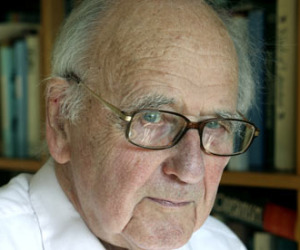2001-2002 Lecture Series

Sir Frank Kermode
King Edward VII Professor of English Literature
University of Cambridge
Lecture One: Pleasure
Tuesday, November 6, 2001 4:10-6:30 p.m.
Toll Room, Alumni House
With commentary by Geoffrey Hartman
Lecture Two: Change
Wednesday, November 7, 2001 4:10-6:30 p.m.
Toll Room, Alumni House
With commentary by John Guillory and Carey Perloff
Seminar and Discussion
Thursday, November 8, 2001 4:10-6:30 p.m.
Geballe Room, Townsend Center for the Humanities, 220 Stephens Hall
With commentary by John Guillory, Geoffrey Hartman, and Carey Perloff
The lectures and the seminar are free and open to the public.
Download and Listen
MP3 Format: Lecture One, Lecture Two, Seminar & Discussion
About Sir Frank Kermode
A leading Shakespeare scholar, Sir Frank Kermode is one of the most important authorities in the field of literary history. Recognized for having devoted his life to bridging the gap between literary criticism and a broader audience, Kermode aims for a non-patronizing critique understood by anyone with a genuine love for literature.
Born in 1919 on the Isle of Man, Kermode served as a lieutenant in the Royal Navy during World War II. He was educated at Liverpool University. Kermode is the former Lord Northcliffe Professor and King Edward VII Professor of English Literature at the University of Cambridge and has taught at numerous universities throughout the world, including Harvard and Columbia. He holds honorary doctorates from several universities and is a Fellow of numerous learned societies, including the British Academy and the Royal Society of Literature. An Honorary Member of the American Academy of Arts and Sciences and the American Academy of Arts and Letters, Kermode was knighted in 1991 by HM the Queen.
Kermode’s most popular works are on Shakespeare (1963-65) and D.H. Lawrence (1973). He is also known for his editorship of “The Oxford Anthology of English Literature” (2 volumes, 1973), and his provocative studies “The Sense of an Ending” (1967), “The Genesis of Secrecy” (1979), and “The Art of Telling” (1983). His autobiography “Not Entitled: a Memoir” was published in 1995. In his most recent book “Shakespeare’s Language” (2000), which “is addressed to a non-professional audience with an interest in Shakespeare,” Kermode argues that Shakespeare became a different writer after 1600, inventing a different and more audacious style for each new play.
About the Commentators
John Guillory
Professor of English
New York University
John Guillory, a Professor of English at New York University, is a leading thinker about the evolving position of literary studies and the academic profession, in general, within societies both past and present. His research interests include Renaissance literature, philosophy, political theory, the history of criticism, the sociology of literary study, and the canon debate.
Guillory’s wide range of publications include “Poetic Authority: Spencer, Milton, and Literary History” (1983), “Cultural Capital: The Problem of Literary Canon Formation” (1993), and “What is Left of Theory?: New Work on the Politics of Literary Theory” (with J. Butler and K. Thomas, 2000). He is currently preparing monographs on the sociology of literary study and on the emergence of philosophical prose in England.
After earning his Ph.D. from Yale in 1979, Guillory taught at Yale, Johns Hopkins, and Harvard Universities. He joined the New York University faculty in 1999. He has held several professional positions, including the Modern Language Association Committee on Professional Employment (1996-97). He has been a recipient of the René Wellek Award of the American Comparative Literature Association (1994) and several other prizes and honors.
Geoffrey Hartman
Sterling Professor Emeritus of English and Comparative Literature
Yale University
Geoffrey H. Hartman is the Sterling Professor Emeritus of English and Comparative Literature at Yale University. Hartman has gained a reputation as an outstanding scholar in the literature of the Romantic period and is widely acclaimed for his contributions to Holocaust studies. He directed the Fortunoff Video Archive for Holocaust Testimonies at Yale and was one of the first to bring survivor testimonies to the general public through documentary films for public television.
Hartman’s numerous publications include “André Malraux” (1960), “Romanticism: Vistas, Instances, Continuities” (1973), “The Fate of Reading and Other Essays” (1975), “Shakespeare and the Question of Theory” (1985), “The State of the Art of Criticism” (1987), “Holocaust Remembrance: The Shapes of Memory” (1994), “The Longest Shadow: In the Aftermath of the Holocaust”
(1996), and “A Critic’s Journey: Literary Reflections, 1958-1998” (1999).
Born in Frankfurt, Germany, Hartman was a child of the Frankfurt “Kindertransport” to England in 1938. He was educated at Queens College in New York and at Yale University, where he earned a Ph.D. Hartman is the recipient of numerous awards, including the 1997 Contemporary Jewish Thought Award, and has been active in the creation of Jewish Studies programs in American colleges.
Carey Perloff
Artistic Director of the American Conservatory Theater
San Francisco
Carey Perloff has guided the American Conservatory Theater (A.C.T.) in San Francisco to unprecedented success since assuming its leadership in 1992. She is known both for her innovative productions of classic works and for acquiring new writing for the theater. During her tenure, A.C.T. has won the prestigious Jujamcyn Theaters Award in 1996, and reopened the Geary Theater damaged in the Loma Prieta Earthquake.
Perloff’s work at A.C.T. includes the Geary Theater inaugural production of Shakespeare’s “Tempest”, featuring David Strathairn and the Kronos Quartet, the American premieres of Tom Stoppard’s “Invention of Love” and “Indian Ink,” and a highly acclaimed production of Timberlake Wertenbaker’s new version of Euripides’ “Hecuba” with Olympia Dukakis. Perloff also teaches in the A.C.T. Advanced Training Program.
Before joining A.C.T., Perloff was the Artistic Director of the Classic Stage Company (C.S.C.) in New York. Under her leadership, the C.S.C. won the Obie Award for artistic excellence in 1988, as well as several Obies for acting, design, and direction.
Perloff received her B.A. in Classics and Comparative Literature from Stanford University and was a Fulbright Fellow at Oxford University. Perloff also was a faculty member of the Tisch School of Arts at New York University for seven years.